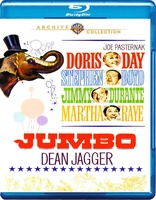Billy Rose's Jumbo Blu-ray Movie
HomeBilly Rose's Jumbo Blu-ray Movie 
Warner Archive CollectionWarner Bros. | 1962 | 127 min | Not rated | Oct 08, 2013
Movie rating
6.9 | / 10 |
Blu-ray rating
| Users | 0.0 | |
| Reviewer | 4.0 | |
| Overall | 4.0 |
Overview
Billy Rose's Jumbo (1962)
A debt-ridden circus struggles to survive against competition from a well-financed competitor who is determined to acquire its number one attraction, Jumbo, the greatest performing elephant in show business.
Starring: Doris Day, Stephen Boyd, Jimmy Durante, Martha Raye, Dean Jagger (I)Director: Charles Walters (I)
| Musical | Uncertain |
| Romance | Uncertain |
| Comedy | Uncertain |
Specifications
Video
Video codec: MPEG-4 AVC
Video resolution: 1080p
Aspect ratio: 2.37:1
Original aspect ratio: 2.35:1
Audio
English: DTS-HD Master Audio 5.1 (48kHz, 24-bit)
Subtitles
English SDH
Discs
50GB Blu-ray Disc
Single disc (1 BD)
Playback
Region free
Review
Rating summary
| Movie | 4.0 | |
| Video | 4.0 | |
| Audio | 4.5 | |
| Extras | 2.5 | |
| Overall | 4.0 |
Billy Rose's Jumbo Blu-ray Movie Review
The Greatest Show on Screen
Reviewed by Michael Reuben October 23, 2013The 1962 musical Billy Rose's Jumbo was a widescreen technicolor extravaganza in the grand MGM style featuring popular stars Doris Day, Martha Ray and Jimmy Durante (who came out of retirement to appear in the film). In another time, it might have been a ripping success, but it fizzled at the box office, despite a massive publicity campaign, and is generally thought to have irreparably damaged Day's film career. A top box office star before Jumbo's release, after its failure she was frozen out of the running for two leads she had been actively seeking in The Unsinkable Molly Brown (1964) and The Sound of Music (1965). Almost thirty years earlier, the original production of Jumbo had been a success on Broadway. With songs by the hit-making team of Richard Rodgers and Lorenz Hart and a book co-authored by the legendary Ben Hecht, the show was the last to be produced in the Great White Way's massive Hippodrome, an arena on the scale of Radio City Music Hall that was demolished in 1939. With the theater transformed into a tented Big Top, Jumbo gave its audience the combination of a day at the circus and an evening of musical theater. Theatrical impressario Billy Rose sold the rights to MGM with the stipulation that his name appear in the title, even if he had no involvement in the film (hence, "Billy Rose's Jumbo"). But then the film rights got bogged down in a lengthy dispute over whether Hecht and his co-authors had borrowed too liberally from other tales about the circus. By the time MGM was ready to make Jumbo, audience taste in musicals had changed. Composer Richard Rodgers had formed his new partnership with Oscar Hammerstein II, and together they had redefined the musical as a dramatic form where songs expressed character. With shows like Oklahoma (stage, 1943; film, 1955), South Pacific (stage, 1949; film, 1958) and The Sound of Music (stage, 1959), Rodgers and Hammerstein transformed the musical from spectacle to drama. The runaway success (and subsequent Oscar sweep) of the 1961 filmed version of West Side Story (music by Leonard Bernstein, lyrics by Stephen Sondheim) confirmed that what had worked for Billy Rose in the Thirties was no longer a viable formula. Still, Billy Rose's Jumbo has its charms. It was well-crafted by director Charles Walters (Easter Parade) and second unit director Busby Berkeley (his last film). It has a tuneful score by Rodgers, and it captures a largely vanished world with the kind of colorful energy for which MGM musicals were famous. Among musicals, Jumbo is a cult classic, which makes it ideal for the Warner Archive Collection (Warner having acquired the film in 1996 when it bought Turner Entertainment).
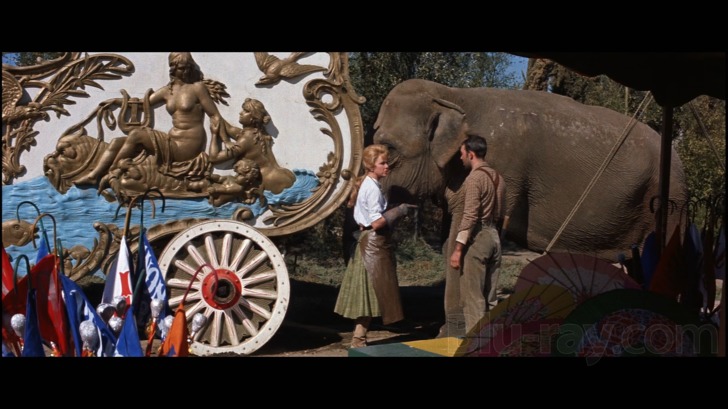
The Wonder Circus travels from town to town, delighting audiences with the usual assortment of clowns, animals, trapeze artists and acrobats. Unfortunately, Pop Wonder (Durante) is a habitual gambler, who routinely empties the till and loses the proceeds. His loyal daughter, Kitty (Day), is constantly forced into charming local businesses (grocers, feed dealers, lumber vendors) to hold their bills just a little longer, only to have Pop disappear with the next night's takings. Their circus is always pulling up stakes a few steps ahead of creditors. The performers routinely go unpaid, and Pop, a perpetual optimist, assumes that they'll stay with him out of loyalty. Unfortunately for Pop, his chief competitor, John Noble (Dean Jagger), better understands human nature, and he's been steadily hiring away the Wonder Circus' acts for some time, simply by promising that people will be compensated for their work—and delivering on his promises. Noble's real goal, however, is to acquire Pop's star attraction: Jumbo, a performing elephant like no other in the business. Jumbo is so smart that, as far as Kitty and Pop are concerned, he's a person and a star performer, not an elephant. As more acts defect, Kitty finds herself pulling double and triple duty to cover for the missing players. One day, a stranger named Sam Rawlins shows up looking for work (Stephen Boyd, best known as Messala in Ben-Hur). Kitty suspiciously turns him away as a "sundowner", circus slang for someone who's here today and gone tomorrow. But Sam sticks around and proves his mettle, and Pop takes to him immediately. So does Pop's long-suffering fiancée, Lulu, who works the sideshow as a fortune teller (Martha Raye, who by this point in her career was a major star on TV). Lulu has long encouraged Kitty to get out and find someone, and she thinks Sam would be a perfect candidate. Indeed, there's chemistry between Kitty and Sam, but Sam keeps pulling away, for reasons Kitty can't understand. Much of Jumbo is taken up with the rehearsals and performances of the Wonder Circus, which MGM stocked with real circus acts and director Walters shot with fluid camera movements. Paralleling the circus routines are the dance numbers choreographed by Busby Berkeley in and around the Big Top props and paraphernalia, which incorporate circus elements into their movement. The best parts of Jumbo have very little to do with the story. They're all about song, movement and comic routines like Pop Wonder's failed efforts to design an act where a man (or, as it happens, Lulu) is shot out of a cannon. Durante also gets to repeat his most famous line from the stage show. Discovered by creditors when he's trying to hide Jumbo, Pop is asked: "What are you doing with that elephant?" Pop stands in front of Jumbo, looks to left and right and deadpans: "What elephant?" Kitty can only shield her father from his debts for so long, and ultimately, through a chain of events that audience members will see coming long in advance, the scheming John Noble acquires the Wonder Circus. Their spirits unbowed, Kitty, Pop and Lulu cobble together a traveling sideshow, where they are shortly joined by Sam, who has managed, by methods that don't bear close scrutiny, to bring along a familiar pachyderm as company. In its last ten minutes, Jumbo trades carnival sleight of hand for movie magic, as the cast performs circus routines freed from the laws of physics or the constraints of time, soaring aloft into realms of fantasy that John Noble could never hope to equal.
Billy Rose's Jumbo Blu-ray Movie, Video Quality 
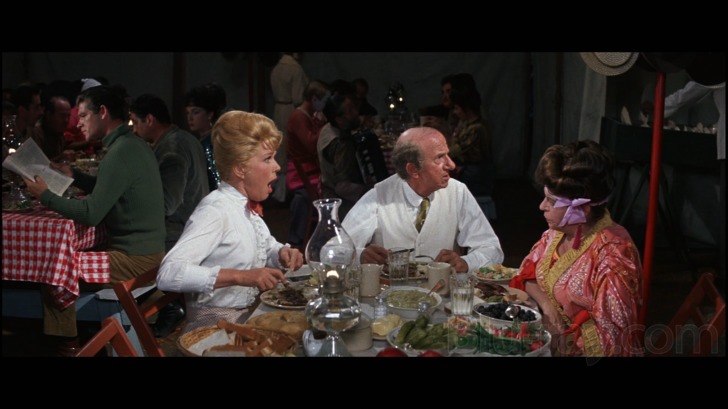
Cinematographer William H. Daniels, an Oscar winner for The Naked City and one of the four cameramen who would be Oscar-nominated for the widescreen visuals of How the West Was Won, shot the technicolor splendor of Billy Rose's Jumbo. Warner's 1080p, AVC-encoded Blu-ray brings home all the rich detail and lush colors for which MGM musicals were noted in a film-like presentation that confirms the Warner Archive Collections's commitment to quality. The meticulously crafted sets and costumes of the Wonder Circus (which are in far too good shape for the organization's poor financial condition) are visible in all their minutia, as are the crowds in attendance at the shows and watching the promotional parade in town. The rich primary colors are as well represented as the pastels of the butterfly costumes used for a particular act, and the blacks of Jumbo's cloaks and the costumes of the high-wire performer known as "Mantino" are deep, silky and solid. None of it looks completely real, but that's the magic of both the circus and MGM musicals. The film's grain structure looks natural but not intrusive, and only rarely does there appear to be a hint of sharpening, mostly in some of the opticals in the final sequence. Compression artifacts are not an issue, thanks to an average bitrate of 28.01 Mbps, which, by Warner standards, is quite generous.
Billy Rose's Jumbo Blu-ray Movie, Audio Quality 
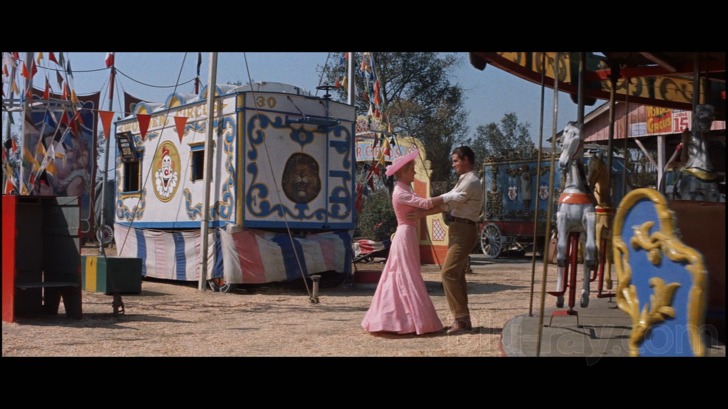
The standard optical track for Billy Rose's Jumbo was mono, but specially equipped venues received a 4-track stereo mix utilizing the Westrex magnetic system. Those stems must have been available to Warner for the lossless DTS-HD MA 5.1 track on this Blu-ray, because the soundtrack is superb. The opening orchestral overture has a lushly harmonious presence, but the real magic begins with the opening chorus of circus workers hammering tentpoles rhythmically into the ground. The percussion instruments that represent the hammering are tight and precise, while the male chorus expands into the surrounds as the camera moves through the circus grounds introducing the viewer to the environment and eventually discovering Doris Day's Kitty hard at work. The overall presentation has clarity and precision beyond anything available on the live stage, even with today's sophisticated audio systems. A similar level of quality prevails throughout the film. Rarely have circus acts been accompanied by an orchestra (largely unseen) of such depth and versatility. The vocal performances have been mixed well enough that the transition from dialogue to studio-recorded singing isn't too jarring, and even the dubbed Stephen Boyd is bearable in his duet with Day on the show's signature song, "The Most Beautiful Girl in the World". (The singing voice has been credited to "James Joyce", presumably no relation to the famous author.) Jumbo, of course, has one of the most cultivated cries in the elephant kingdom.
Billy Rose's Jumbo Blu-ray Movie, Special Features and Extras 
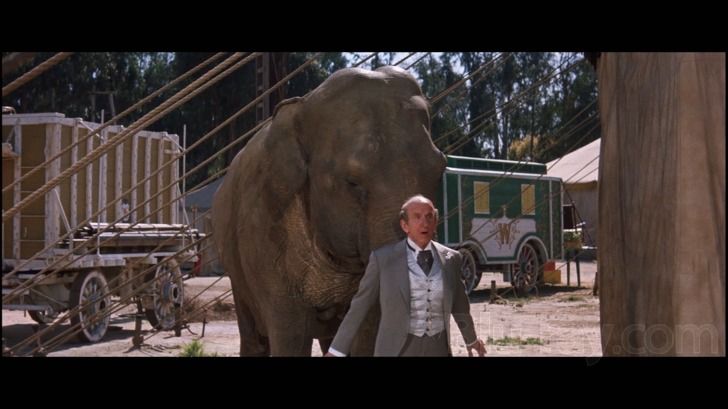
The special features have been ported over from Warner's 2005 DVD of Billy Rose's Jumbo (which also featured the "Original Overture Rejoined to the film", thereby making the claim on the Blu-ray's back cover that this is the first appearance of the overture "in over 50 years" technically inaccurate):
- Jerry and Jumbo (1080p; 1.37:1; 7:05): This 1953 Tom and Jerry cartoon involves a baby elephant who makes common cause with the beleaguered mouse. The formatting may read as 1080p, but the source appears to be upconverted standard definition.
- Yours Sincerely (1080p; 1.37:1; 19:35): This is a 1933 Vitaphone short that also features a score by Rodgers and Hart. Here again, while the formatting may be 1080p, the source is standard definition, and the elements are in poor shape.
- Theatrical Trailer (1080p; 2.35:1; 3:19). Although the source isn't the best, this is the only extra that actually looks like HD.
Billy Rose's Jumbo Blu-ray Movie, Overall Score and Recommendation 
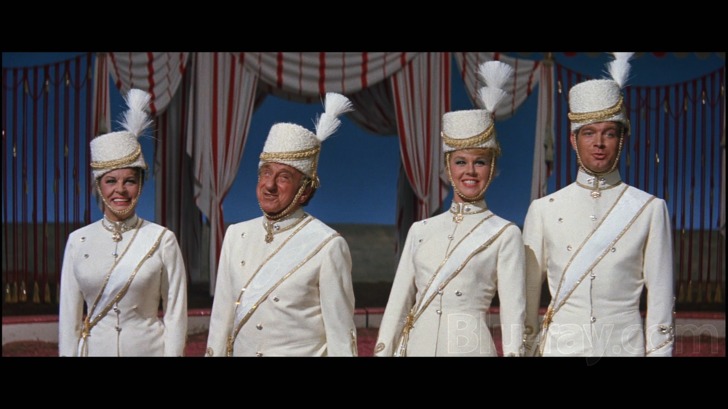
When Billy Rose's Jumbo was announced as a Warner Archive offering, a collective groan was audible on the Blu-ray.com forum. This, when there are so many others possibilities? One can't help but wonder whether many of the protesters were the usual suspects who appear whenever musicals are the topic, gravely intoning that they don't like musicals because it's "unrealistic" for characters to break into song. Now, anyone who has read this far probably doesn't share that complaint, but I hereby propose a test to be offered to anyone who registers it in the future: Go to your Blu-ray and DVD library and count the titles dealing with Middle Earth. Now count the titles dealing with adventures in space, including Star Wars, Star Trek (movie or TV), Battlestar Galactica, Stargate (any version), Farscape, Firefly or any other variety. Now count all comic book-inspired movies, including Batman, Ironman, The Avengers, Spider-Man, any version of Superman, etc. Add up all vampire or monster tales, which can include anything from the classic Frankenstein or Dracula to Buffy the Vampire Slayer. Total all Terminator films, zombie tales of any kind, films with supernatural elements or slasher franchises with unstoppable killing machines, including Friday the 13th, Halloween and A Nightmare on Elm Street. Sum up all these categories for a grand total. If that number is less than five, then you can talk to me about "realism" in movies. Meanwhile, Billy Rose's Jumbo is highly recommended as a superior Blu-ray presentation of a well-crafted musical whose only real flaw was that it appeared at the wrong time.
Similar titles
Similar titles you might also like

Road to Zanzibar
1941

Road to Rio
1947

My Dream Is Yours
Warner Archive Collection
1949

Kiss Me Kate 3D
1953

The Pirates of Penzance
1983

Blue Skies
1946

The Boy Friend
Warner Archive Collection
1971

Victor/Victoria
1982

Hit the Deck
Warner Archive Collection
1955

The Pajama Game
Warner Archive Collection
1957

Hello, Dolly!
Fox Studio Classics
1969

Frankie and Johnny
1966

Mother Wore Tights
Limited Edition
1947

On the Town
1949

Strike Up the Band
Warner Archive Collection
1940

Silk Stockings
Warner Archive Collection
1957

Shall We Dance
1937

Dangerous When Wet
Warner Archive Collection
1953

Take Me Out to the Ball Game
Warner Archive Collection
1949

Guys and Dolls
Warner Archive Collection
1955
